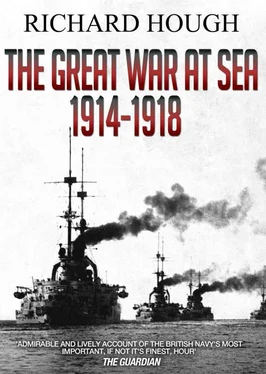It is no reflection on the prodigious and continuing effort and glorious courage of the armies in France and the numerous other theatres of war, or of the airmen who gave them such valiant assistance, to say that the Royal Navy provided the greatest contribution to victory by its perpetual and mainly unseen and soundless pressure. It was the blockade that finally drove the Central Powers to accept defeat. At first mild in its application, the blockade’s noose gradually tightened until, with the American entry, all restraint was cast aside. Increasingly deprived of the means to wage war, or even to feed her population, the violent response was insurrection; apathy and demoralization the mute consequence of dashed hopes and thin potato soup.
‘No historian’, wrote a great military historian of the Great War, ‘would underrate the direct effect of the semi-starvation of the German people in causing the final collapse of the “home front". But leaving aside the question of how far the revolution caused the military defeat, instead of viceversa, the intangible all-pervading factor of the blockade intrudes into every consideration of the military situation.’ The blockade, concludes Basil Liddell Hart, was ‘clearly the decisive agency in the struggle.’ (27)
The effort of sustaining that blockade and the Fleet that made it possible was prodigious, demanding an incalculable toll on human ingenuity, courage, patience, spirit, and belief in the cause, and on the material and economic resources of the nation and its empire. The price paid could be seen by 1921 in tangible terms in the enforced reduction of the size of the Royal Navy to that of its ex-ally the United States, whose own naval competition with the Japanese Empire was already set on its compass course to Pearl Harbor.
THE most important source of unpublished papers on the naval war at sea 1914-18, and on the years leading up to the Great War, is the Public Record Office at Kew, London, where the Admiralty Record Office MSS are essential for any serious student of this period. Also held at the PRO are The Foreign Office MSS, the Additional (Add.) MSS, and British Documents. Other important sources are the British Library in London (e.g. Jellicoe MSS: MSS 48989-49057): Naval Library. Ministry of Defence, London (e.g. Jackson MSS); National Maritime Museum Library, Greenwich (e.g. Richmond MSS); and Churchill College, Cambridge (e.g. Drax MSS).
The most comprehensive published guide to manuscript sources is in Arthur J. Marder’s From the Dreadnought to Scapa Flow , v 346-61. However, this was published in 1970 and some of the addresses are out of date. For example, the highly important Beatty MSS may now be consulted at the National Maritime Museum. Greenwich. This same volume also contains an invaluable list of published works with comments, sometimes of a cryptic nature.
1. Cadet Stephen King-Hall to his parents, 3 February 1906; My Naval Life (1952)
2. Including The Influence of Sea Power upon History 1660 - 1783 (1890) and The Influence of Sea Power upon the French Revolution and Empire 1790 - 1812 (1892)
3. Observer , 18 July 1909
4. Commander G. Lowis, Fabulous Admirals (1957) p. 35
5. Pall Mall Gazette , October 1904
1. Charles Middleton, first Lord Barham (1726-1813), Controller of the Navy 1776-1806
2. Quoted by F. Lascelles to E. Grey, Foreign Secretary, 16 August 1906; British Documents, viii. 192
3. Manchester Guardian . 29 December 1907
4. The Times , 6 March 1908
5. Captain Philip Dumas RN to F. Lascelles, 12 January 1908; British Documents. vi. 124-5
6. Cabinet paper, ‘Naval Estimates 1914-15’, 10 January 1914: Asquith MSS
7. Sir Francis Knollys to Lord Esher. 10 February 1909; Esher MSS
8. Winston S. Churchill, The World Crisis , 1914-19 . 5 vols. (1923-9). i. 37
9. Daily Exprese , 20 March 1909
10. Rear-Admiral Sir Robert Arbuthnot
11. Churchill, World Crisis . i. 74-5
12. Admiral Lord Fisher to Lord Esher, 2 February 1910; Kilverstone MSS
1. 3 March 1910: Lennoxlove Papers
2. Churchill. World Crisis . i. 70
3. Standard , 5 July 1911
4. Churchill. World Crisis . i. 81-2
5. J. S. Sandars to A. J. Balfour. 14 November 1911; Balfour papers
6. Admiral J. Marder. From the Dreadnought to Scapa Flow , 5 vols. (1961-70), i. 253
7. 21 December 1912
8. Admiral G. von Müller to Admiral F. von Tirpitz, 4 June 1914: German Ministry of Marine MSS
9. Lennoxlove Papers
10. Fisher to Churchill, 16 January 1912; Arthur J. Marder, Fear God and DreadNought : the Correspondence of Admiral of the Fleet Lord Fisher of Kilverstone , 3 vols (1952-9). ii. 426
11. Churchill, World Crisis , i. 123
12. Churchill to Fisher. 11 June 1912; Admiralty MSS
13. Add. MSS 49694, 6 January 1912 and 9 January 1912
14. 5 June 1914
15. Randolph Churchill/Martin Gilbert. Winston S . Churchill , 27 vols., with Companion vols. of Papers (1966 – ), ii. 688. Hereafter referred to as Churchill/Gilbert
16. Lennoxlove Papers
17. Army and Navy Gazette , 17 May 1913
18. Admiral Sir William James to A. J. Marder. undated but probably 1967: Marder Papers
19. James to Marder, 21 February 1967; Marder Papers
20. James to Marder, 3 February(?) 1967: Marder Papers
21. Churchill/Gilbert, Companion ii to Churchill ii. p. 1304.
22. ibid., p. 1312
1.Churchill, World Crisis , i. 37
2. Foreign Office MSS 800/87
3. Tirpitz to Bethmann Hollweg, n.d. (25 October 1911); German Ministry of Marine MSS
4. Memo on ‘Suddenness in Naval Operations’, 1 March 1905; Balfour MSS
5. 118th meeting of Committee of Imperial Defence (CID): Asquith MSS
6. Captain Hugh Watson, RN, to Sir Edward Grey, 30 June 1913; Marder Papers
7. Foreign Office MSS 800/87
8. Rear-Admiral Sir Edward Troubridge, 20 June 1912; British Documents, ix (Pt. i). 413-16
9. Foreign Office MSS 800/87
10. 23 August 1912 quoted in Churchill World Crisis , i. 112
11. 29 January 1914 Asquith MSS
12. Rear-Admiral William S. Chalmers, The Life & Letters of David , Earl Beatty (1951), p 99
13. Captain Hugh Watson. RN, to Sir Edward Goschen, 13 October 1913; British Documents, x (Pt. 2). 716
1. Churchill. World Crisis , i. 190
2. Richard Hough. Mountbatten ; Hero of our Time (1980), p. 27
3. Richard Hough, Louis & Victoria : the First Mountbattens (1973), p. 280
4. Churchill, World Crisis , i. 212
5. G. Callender, The Naval Side of British History (1924)
6. CID Report 54-A (PRO)
7. Beatty MSS
8. Churchill/Gilbert, Churchill . iii. 15
9. John Winton, Jellicoe (1981), p. 144
10. Sir Julian S. Corbett/Sir Henry Newbolt, History of the Great War . Naval Operations , 5 vols. (1920-31), i. 177
11. 18 August 1914; Jellicoe MSS
12. Chalmers, Beatty , p. 161
13. ibid., p. 158
14. Churchill/Gilbert, Companion iii to Churchill ii, p. 222
Читать дальше












